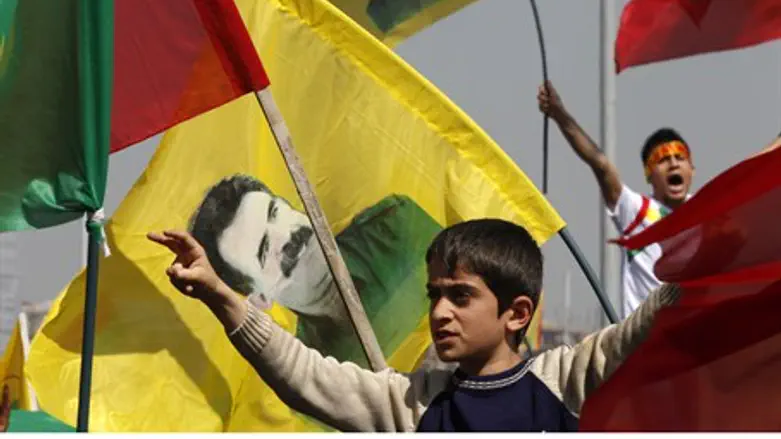
Turkey on Saturday prepared for its tightest elections in over a decade, with tensions riding high after a bomb attack killed two and wounded dozens at a rally of the main pro-Kurdish party.
Judicial sources said the explosions at a rally Friday of the pro-Kurdish People's Democratic Party (HDP) in the southeastern city of Diyarbakir was caused by a cylinder bomb packed with hundreds of ball bearings.
The ruling Justice and Development Party (AKP) is hoping to take a large majority in Sunday's legislative elections and change the constitution to give Turkey's charismatic but divisive President Recep Tayyip Erdogan more power.
But polls have indicated that its vote could be well down on the almost 50 percent score the AKP reaped in the last elections in 2011 and that it may even need to form a coalition.
Tensions soared after the twin explosions at the HDP rally, which judicial sources and the government confirmed were caused by a bomb.
"The experts collected hundreds of ball bearings and pieces of the metal cylinder," said a judicial source, who asked not to be named.
The source confirmed that no suspect had yet been arrested over the blast but fingerprint and video evidence had been found.
Two blasts several minutes apart rocked the rally. It was the second blast which caused the casualties.
Agriculture Minister Mehdi Eker said "one of the explosions was caused by TNT and the other was very likely caused by TNT." Mobile phones had been used for the detonations, he added.
In a statement, Diyarbakir prosecutors confirmed that two people had been killed and over 100 wounded.
The funeral was held Saturday morning for one of those killed, Ramazan Yildiz, who was only 17, an AFP photographer reported.
'Hold AKP to account'
The blasts were the latest strike in the campaign against the HDP, which represents Turkey's Kurdish minority but is increasingly reaching out to secular Turks.
It has already seen one of its drivers shot dead, regional offices attacked and one of its other rallies stormed by nationalists.
President Recep Tayyip Erdogan said in a television interview late Friday that the strike were a "bid to overshadow the elections."
The explosion resulted in the cancellation of the HDP's Diyarbakir rally, one of the centerpieces of its campaign, where party leader Selahattin Demirtas was due to give a speech.
"The aim was to spread chaos and win votes. The aim was that chaos reigns in the country," Demirtas said at a rally in Istanbul Saturday, adding there had been 124 attacks against the party in the campaign.
Several thousand people Saturday held a sit-in protest at the scene in Diyarbakir, waving HDP flags and chanting the "AKP will be held accountable."
Last day of campaigning
The HDP has been leading an energetic campaign aimed at surmounting the tough 10 percent vote barrier needed to send MPs to the Turkish parliament.
Should it succeed, the party could wreck the plan of the AKP to take a large majority and change the constitution to give Erdogan more powers.
In a bitter and personal campaign, Erdogan launched a series of attacks against Demirtas, rubbishing him as a "pretty boy" acting as a front for Kurdistan Workers Party (PKK) Kurdish militants.
Turkey's political leaders made a final push for votes Saturday ahead of the early evening legal deadline for campaigning to end.
Prime Minister Ahmet Davutoglu, his voice reduced to a croak by the strain of a marathon campaign, was winding up his tour with an address to tens of thousands of supporters in his home region of Konya in central Turkey.
The participation in the campaign of Erdogan, who served as premier from 2003-2014 is hugely controversial, as since becoming president in August last year he should have severed his links with party politics.
Erdogan Saturday fired off any angry attack at foreign media over their coverage of the elections, saying the Guardian should "know (its) limits" and "Jewish capital" was behind the New York Times.
The AKP has been under greater pressure than in previous polls, with the economy losing some of its former sparkle and controversy growing over what critics say are Erdogan's authoritarian tendencies.
The main opposition Republican People's Party (CHP) is expected to come second followed by the Nationalist Movement Party (MHP) and then the HDP in fourth place.